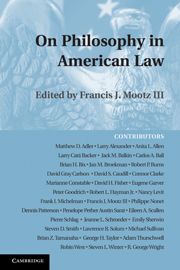Book contents
- Frontmatter
- Contents
- Introduction
- PART I KARL LLEWELLYN AND THE COURSE OF PHILOSOPHY IN AMERICAN LAW
- PART II PHILOSOPHICAL PERSPECTIVES ON LAW
- PART III AREAS OF PHILOSOPHY AND THEIR RELATIONSHIP TO LAW
- 12 On Philosophy in American Law: Analytical Legal Philosophy
- 13 Political Philosophy and Prosecutorial Power
- 14 On (Moral) Philosophy and American Legal Scholarship
- 15 The Aretaic Turn in American Philosophy of Law
- 16 On Continental Philosophy in American Jurisprudence
- 17 Psychoanalysis as the Jurisprudence of Freedom
- PART IV PHILOSOPHICAL EXAMINATIONS OF LEGAL ISSUES
- PART V LAW, RHETORIC, AND PRACTICE THEORY
- PART VI QUESTIONING THE RELATIONSHIP BETWEEN PHILOSOPHY AND AMERICAN LAW
- PART VII COMMENTARIES
- Contributors and Selected Bibliography
- Name Index
- References
12 - On Philosophy in American Law: Analytical Legal Philosophy
Published online by Cambridge University Press: 31 July 2009
- Frontmatter
- Contents
- Introduction
- PART I KARL LLEWELLYN AND THE COURSE OF PHILOSOPHY IN AMERICAN LAW
- PART II PHILOSOPHICAL PERSPECTIVES ON LAW
- PART III AREAS OF PHILOSOPHY AND THEIR RELATIONSHIP TO LAW
- 12 On Philosophy in American Law: Analytical Legal Philosophy
- 13 Political Philosophy and Prosecutorial Power
- 14 On (Moral) Philosophy and American Legal Scholarship
- 15 The Aretaic Turn in American Philosophy of Law
- 16 On Continental Philosophy in American Jurisprudence
- 17 Psychoanalysis as the Jurisprudence of Freedom
- PART IV PHILOSOPHICAL EXAMINATIONS OF LEGAL ISSUES
- PART V LAW, RHETORIC, AND PRACTICE THEORY
- PART VI QUESTIONING THE RELATIONSHIP BETWEEN PHILOSOPHY AND AMERICAN LAW
- PART VII COMMENTARIES
- Contributors and Selected Bibliography
- Name Index
- References
Summary
THE RECEPTION OF ANALYTICAL LEGAL PHILOSOPHY
Analytical legal philosophy is the study of the nature of law, and the nature of legal concepts, through analysis – the breaking down to component parts, the search for necessary and sufficient conditions, or the rational reconstruction of a practice. It is connected to, or a subcategory of, the analytical tradition in philosophy generally, a tradition that has dominated English-language philosophy for the past century.
In Britain, analytical legal philosophy is at the center of jurisprudence, a position it has held basically since John Austin's work in the early nineteenth century (e.g., Austin 1995). It is not accidental that most of the central work in analytical jurisprudence has been done by theorists teaching at British universities (e.g., Austin, H. L. A. Hart, Joseph Raz, and Neil MacCormick). In particular, modern English-language legal philosophy largely derives from the work of Hart (1968, 1982, 1983, 1994). In other countries, legal philosophy is often dominated by theories that derive from the work of another analytical legal philosopher (and another legal positivist), Hans Kelsen (e.g., 1992).
Matters have always been different on this side of the Atlantic. In the United States, analytical legal philosophy has been both consistently misunderstood and marginalized. For an American scholarly audience that tends to focus on practical questions – in particular, how should judges decide cases? And how should the Constitution be interpreted and applied? – the analytical questions about the basic nature of law and legal concepts seem out of place.
- Type
- Chapter
- Information
- On Philosophy in American Law , pp. 99 - 105Publisher: Cambridge University PressPrint publication year: 2009
References
- 1
- Cited by



